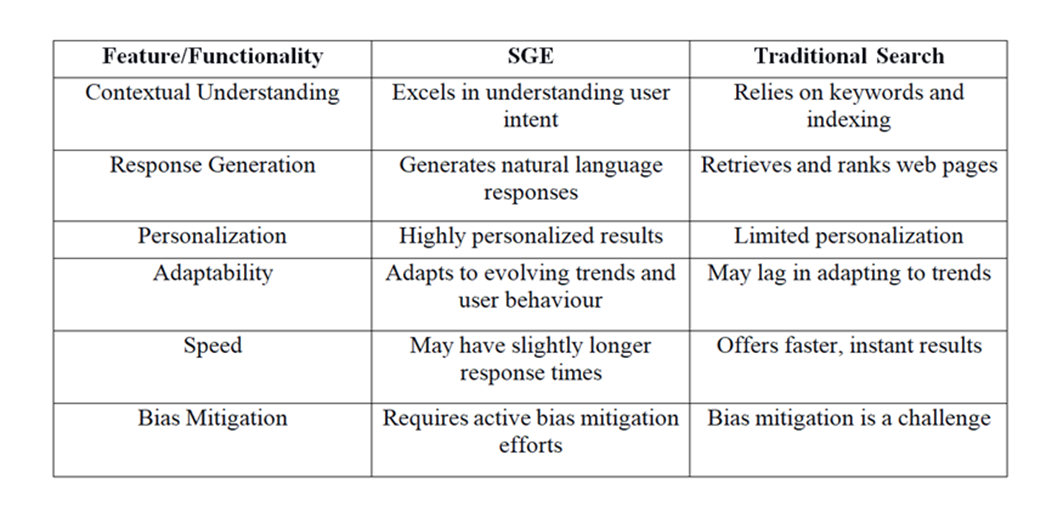
Google SGE vs. Traditional Search: A New Era in Information Retrieval
Google’s Search Generative Experience (SGE) is the most recent revolution in online information retrieval. Unlike traditional search engines, Google SGE depends on advanced generative AI models to understand and answer client queries in a more nuanced and context-aware way.
While utilising Google SGE, you can get brief solutions to your questions and relevant visual content. Also, Google App has included directing indicators to assist you with deeper into your chosen subjects or topics. This new advancement makes it possible to ask more inquiries. It makes communicating with the search engine simpler and smoother.
While SGE is a groundbreaking development, it’s vital to have a firm grasp of traditional search algorithms to appreciate the significance of this new period in information retrieval. These algorithms, like PageRank and TF-IDF, have been the foundation of search engines for decades.
This article will discover the subtle differences between the Google Search Generative Experience and traditional search. The object is to look into these two approaches comprehensively and thoroughly. Toward the end of this exploration, you’ll understand the benefits, disadvantages, and possible effects of SGE on how we access and the future of information retrieval.

Understanding Traditional Search Algorithms
A. Explanation of how traditional search algorithms work
The key points suggested below showcase the workings of search algorithms –
1. Crawling
Traditional search engines use web crawlers or spiders to scan the web and accumulate data from pages. These crawlers follow links and index the content they find.
As per stats – With regards to finding exact results for questions related to business information, traditional search engines are, as yet, the most dependable option available.
2. Indexing
When the content is gathered, it is organised into an index. This vast index contains data about each website page, including keywords, meta tags, and more.
3. Positioning
When a client enters a search question, the search engine retrieves significant results from the index. Traditional algorithms consider keyword density, link popularity, domain authority, and web page authority to rank these results.
B. Key components of traditional search, including keywords, indexing, and ranking
1. Keywords
Traditional search heavily depends on keywords, words, or phrases that clients type into the search bar. These keywords are utilised to match against the indexed content and track down relevant results.
2. Indexing
The index is the core of traditional search. It’s a structured database that stores information about web pages. This makes it simpler to retrieve relevant results quickly.
3. Ranking
Traditional search algorithms assign a significance score to each indexed web page based on variables like keyword usage, inbound and outbound links, and more. This score decides the order of results.
C. Advantages and limitations of traditional search
Key points listed below showcase both the benefits and limitations of traditional search –
Benefits:
1. Speed
Thanks to their organised indexes, traditional search engines are known for delivering search results faster.
2. Productivity
These algorithms are highly improved for delivering significant results for common inquiries.
3. Widespread Use
Traditional search engines like Google are generally adopted and familiar to clients, making them available and easy to use.
Limitations:
1. Limited Contextual Understanding
Traditional search algorithms need help understanding certain words in the context of a question, for example, which can prompt less exact results.
2. Lack of Personalisation
They may not give highly personalised results tailored to a singular client’s preferences and behaviours.
3. Vulnerability to SEO Manipulation
Traditional search algorithms can be manipulated by SEO tactics, leading to less trustworthy results.
Introducing Google’s SGE

A. Definition of SGE and its role in modern search:
Google Search Generative Experience is another approach to information retrieval and search engines created by Google. It leverages generative artificial intelligence models like ChatGPT and BRAD to improve the search experience by generating natural language responses to search inquiries.
Role in Modern Search
SGE, while browsing, addresses a paradigm shift in modern search technology. It aims to give more logical, contextually relevant, and human-like responses to client inquiries. This moves beyond traditional keyword-based Google searches.
B. How SGE differs from traditional search in terms of methodology:
Key points mentioned below can help you determine how the SGE results while browsing prove to be different than traditional search –
1. Contextual Understanding
SGE succeeds in understanding the context of client questions. It can interpret the meaning behind an inquiry and client intent, which traditional search might battle with.
2. Generative Responses
Unlike traditional search engines that retrieve and rank existing site pages, SGE creates responses in natural language. It can create educational articles and contextually relevant responses to inquiries, along with follow-up questions and featured snippets.
3. Personalisation
SGE has the potential for highly customised organic search results, adjusting to individual client preferences and behaviours, while traditional search depends more on a one-size-fits-all approach.
4. Machine Learning Models
SGE depends on complex AI models like deep neural networks and transformers. This enables it to learn and adjust consistently to develop search patterns.
C. The emergence of SGE as a transformative technology:

1. Technological Advancements
Google SGE has emerged as a transformative innovation because of natural language processing and generative AI research advancements.
2. Google’s Initiatives
Google has been at the forefront of developing and executing SGE. Google App has invested heavily in generative AI research for more powerful search experiences.
3. User Expectations
As clients become more familiar with conversational AI and personalised encounters, SGE has become a natural progression to meet these developing expectations.
4. Industry Impact
SGE isn’t restricted to research; it can reshape the search industry. This prompted competitors to explore similar AI-driven approaches.
Advantages of SGE
A. Enhanced understanding of user intent:
SGE is highly skilled at analysing the context of a question. This empowers it to comprehend client intent even when questions are perplexing and complicated concepts. As a result, Google SGE can convey exact outcomes.
With its standard language processing and new generative AI capabilities, SGE can interpret conversational inquiries. This component feature enables a more natural, human-like communication between clients and SGE.
As per numbers – this latest version of search offers comprehensive local business data, including listings, reviews, and maps, with a 100 %accuracy rate. In comparison, conventional Google searches give this data an accuracy rate of 80%
B. Improved personalisation and relevance of search results:
SGE, while browsing, can personalise search labs’ results based on a client’s search history and preferences. This implies that two clients entering a similar question might get various results tailored to their requirements.
The upgraded personalisation leads to expanded client satisfaction as it conveys results that are bound to align with their interests.
C. Adaptability to evolving user behaviours and search trends:
SGE models constantly learn and adjust to changing clients’ behaviour and search labs’ patterns. This adaptability guarantees that Google search results stay significant and up-to-date.
The ability to remain current with evolving patterns allows SGE to answer emerging topics and client preferences effectively.
D. Real-world examples showcasing the benefits of SGE:
Here is an excellent SGE real-world use case by Search Engine Land.
In the case of a cloud-native developer tool, one of the client’s corporate sites experienced remarkable growth in organic traffic, reaching 175,000 monthly sessions by 2023 Q3 from just 21,000 in September 2021. The challenge was to address a potential loss of rank and organic valuable traffic for key keywords due to search engine updates (SGE).
To tackle this, the team at Search Engine Land optimised existing pages and created new ones tailored to the Google SGE experience. The outcome was promising, with 88% of optimised pages and 37% of new web pages entering the SGE snapshot carousel. Post-project, the expected rank loss reduced from 7 to 2 strategic keywords, and the worst-case traffic drop improved from 75% to 57%, demonstrating significant risk mitigation.
While some risk remains in certain scenarios, ongoing keyword optimisation offers a path to further mitigate potential setbacks and ensure a robust online presence for the client’s product.
Drawbacks of SGE
A. Privacy concerns and data usage in SGE:
SGE, while browsing, might raise worries about client privacy as it depends on collecting and analysing a lot of client information to personalise organic search results.
Clients might stress over how their data is utilised and whether it’s adequately protected from breaches or misuse.
B. Challenges in training and fine-tuning SGE models:
Training and fine-tuning generative artificial intelligence models, similar to those utilised in SGE, can be resource-intensive and require vast computational power and information.
Keeping up with and updating these models to guarantee their accuracy and significance can likewise be challenging and costly.
C. The risk of bias and misinformation in generative algorithms:
Generative algorithms, including those for Search Generative Experience, may perpetuate biases in the training information. This leads to biased or wrong search results.
There’s a gamble of generating false or misleading data, especially when the model lacks a source of truth to validate responses.
D. Instances where SGE may underperform compared to traditional search:
SGE, while browsing, might battle in situations where exact, authentic data is required, like medical diagnoses or legitimate advice.
In situations without sufficient training information or established patterns, Google SGE might give less reliable outcomes compared to traditional search algorithms.
Traditional search engines remain the most accurate for organic search results containing business information.
Comparative Analysis: SGE vs. Traditional Search
A. Head-to-head comparison of key features and functionalities:

B. Evaluation of user experiences in SGE vs. traditional search:
Client experience in SGE while browsing is often more engaging because of natural language responses and personalised AI-generated answers. It gets more engaging because of improved context understanding.
Traditional search offers quicker response times yet may expect clients to refine their questions for exact outcomes.
Client fulfilment might shift in view of individual preferences and the question.
C. Impact on content creators, SEO, and businesses:
Content creators might have to adjust to SGE by producing top-calibre, informative content that can be utilised as a reference by SGE models.
SEO practices might move from keyword optimisation to additional holistic content strategies and context-driven approaches.
Businesses can profit from highly personalised recommendations in SGE yet may likewise need help to stand out in search results.
As per research – SGE while browsing is not always activated by a query. Only in the cases where Google believes AI can provide customers with an improved experience will SGE replies be displayed.
D. Case studies illustrating the differences and outcomes
Here are some generic illustrations of how traditional Google Chrome search differs from SGE –
Illustration one –
Traditional Search: In the past, search engines primarily relied on keyword matching. Users would enter specific keywords, and search engines would return results based on exact matches or close variants. For example, if you searched for “best Italian restaurants,” you’d get results containing those exact words.
SGE: Modern search engines, like Google, employ sophisticated AI-powered algorithms that go beyond keywords. They consider user intent, context, and semantics. If you now search for “best Italian restaurants,” Google App might show results with information on nearby Italian eateries, reviews and even provide directions, understanding that you’re likely looking for recommendations and not just AI generated list list of words.
Illustration two –
Traditional Search: Early search engines didn’t prioritise mobile-friendliness or user experience. The same results were often displayed regardless of the device used.
SGE: In the mobile-first era, search engines prioritise mobile-friendly websites. They also consider factors like web page loading speed and responsive design. For instance, a website optimised for mobile devices may rank higher in search results when accessed from a mobile phone.
Adaptation and Integration
A. Strategies for businesses and content creators to adapt to SGE:
1. Figure out the shift
Businesses and content creators ought to recognise the advancing scene of search and acknowledge the significance of natural language understanding and personalisation.
2. Content quality
Focus on delivering superior-grade, informative content that is bound to be referred to and utilised by SGE models.
3. Semantic SEO
Embrace semantic Search engine optimisation practices that go beyond keywords and emphasise context, intent, and client engagement.
4. Monitor and adapt
Consistently monitor search patterns and client behaviour and adjust content and strategies accordingly to remain relevant.
B. Balancing between traditional SEO practices and SGE optimisation:
1. Hybrid approach
Consider a mixture technique that combines traditional SEO practices with SGE optimisation. Traditional search algorithms might ideally service specific questions.
2. Content structure
Guarantee that content is organised and well-structured, with clear headings and metadata, to take special care of both traditional indexing and SGE’s contextual understanding.
3. Client experience
Focus on client experience by making web content that draws in and offers some benefits to clients. This lines up with SGE’s attention to relevance and quality.
C. The role of SGE in future search engine optimisation:
1. Voice search
Prepare for the developing significance of voice search optimisation, as voice assistants like Google Assistant often utilise SGE.
As per stats, Voice search was used by 27% of people using mobile devices in 2023.
2. Conversational content
Develop content that can connect with clients in natural discussions, as SGE answers conversational questions well.
3. Organised information
Implement organised information markup to give context and metadata that can help both traditional search engines and SGE models.
4. AI-powered SEO tools
Explore using AI-powered SEO tools that can assist with improving content for SGE and other AI-driven search technologies.
The Future of Information Retrieval
A. Speculation on the future of search technology:
1. Voice and multimodal search
Expect the rise of voice and multimodal search interfaces, where clients can search by utilising voice orders, pictures, and, surprisingly, augmented reality.
2. Integration of artificial intelligence
Expect further integration of artificial intelligence and machine learning advances into search. This empowers more understanding, predictive search, and context-aware results.
3. Customisation and personalisation
Predict that search engines will become even much more custom-made for individual clients. This offers highly customised encounters.
4. Enhanced context awareness
Envision search engines that figure out client context across gadgets and can give seamless, context-aware assistance.
B. How SGE and traditional search may coexist or evolve:
1. Coexistence
SGE and traditional inquiry might coexist, with SGE taking care of complex topics and questions and customised results. While traditional search stays viable for less complex, fact-based searches.
2. Hybrid models
Expect the improvement of hybrid search models that combine the strengths of SGE and traditional search to convey complete and precise outcomes.
3. Continuous evolution
Both SGE and traditional search algorithms will keep on advancing. They will learn the new features from one another and incorporate headways in generative AI and NLP.
C. Predictions for the impact of SGE on the search landscape:
1. Improved user experiences
SGE’s effect will probably prompt superior client satisfaction and commitment as search engines become more spontaneous and responsive.
2. Redefining SEO
SGE, while browsing, will reshape the field of SEO, emphasising content quality, page context, and client engagement over keyword optimisation.
3. Business opportunities
SGE while browsing might create new opportunities for organisations to associate with clients through highly customised suggestions and conversational interfaces.
4. Ethical considerations
Expect ongoing discussions and regulations surrounding the ethical use of search generative experience SGE and AI in information retrieval to ensure fairness and privacy.
|
Discover the most relevant agencies for your project based on your own specific requirements.
Find an agency!Over to you
We’ve explored the benefits of SGE while browsing, including its improved client understanding and personalisation, alongside its disadvantages, such as protection concerns and biases.
Conventional Google search algorithms offer speed but frequently lack the depth of understanding. Significantly, Google App SGE remains a transformative power in information retrieval. This heralded a new era of search technology.
We urge readers to remain educated and versatile in this evolving scene, where SGE and traditional search coexist. It guarantees they harness the maximum capacity of these evolving tools to their advantage.





